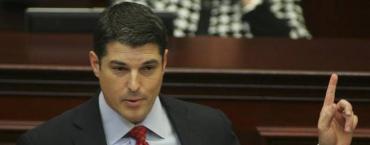
House leaders backed off a request for tens of millions of dollars in bonding for education and environmental projects Thursday, removing one of the stumbling blocks to a final deal on a state spending plan for the budget year that begins July 1.
But several obstacles --- including how to divvy up $1 billion in health-care funding --- remained as lawmakers race the clock to approve an agreement by June 30 and avoid a government shutdown. Legislators are trying to finish their work by the scheduled June 20 conclusion of a special legislative session.
Talking to reporters after the House finished meeting Thursday, the 11th day of a special session called to resolve a budget impasse, Speaker Steve Crisafulli said his chamber was backing off any further attempts to borrow money to help finance land purchases and school construction.
"We're formulating a budget without bonding at this point in time," said Crisafulli, R-Merritt Island.
In some cases, the House had already formally yielded, removing $33 million for bonding from its offers on the state's environmental projects. That borrowing would have allowed lawmakers to spend more than $300 million.
But House negotiators had said that they believed the topic could surface again when House Appropriations Chairman Richard Corcoran, R-Land O' Lakes, and Senate Appropriations Chairman Tom Lee, R-Brandon, began higher-level talks on the spending plan. Corcoran and Lee held their first meeting Thursday, though they did not trade offers on parts of the budget involving bonds.
Crisafulli said the decision not to issue bonds would leave less funding for priorities like Everglades restoration and the Florida Forever land conservation program.
"Certainly, there is going to be money that's put into those, just not as much as you would have at a 10-to-1 rate on bonding," he said.
Senate leaders, fresh off an unsuccessful effort to persuade the House to accept billions of dollars of federal money to expand health insurance coverage for low-income Floridians, had argued that it was hypocritical to turn down that funding and then borrow money for other projects.
"We sort of felt like it was somewhat inconsistent to whip out the credit card, as I've said previously, and at the same time try to keep the budget from growing from accepting federal dollars in other areas," Lee reiterated Thursday.
Lee was speaking after his meeting with Corcoran but before Crisafulli's comments.
House Minority Leader Mark Pafford, D-West Palm Beach, slammed the decision to abandon bonding after voters in November approved a constitutional amendment devoting a specific share of real-estate taxes to water and land projects. The amendment passed with 75 percent of the vote.
"Not to look at every option to do that and to follow through with the voters' demands ... we've failed," said Pafford, who also is chief executive officer of the Arthur R. Marshall Foundation for the Everglades. "I think it's legislative malfeasance. I don't think we've done the job we needed to do."
There was no immediate deal on how to structure $1 billion payments from the state's Low Income Pool program to hospitals and other health-care providers that care for large numbers of low-income patients.
Corcoran said a deal was "imminent," then added: "Certainly within the next 10 days."


